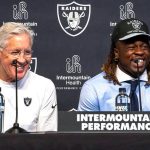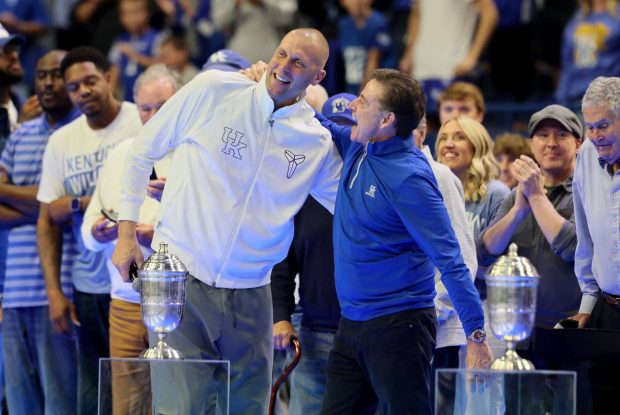
<!–>
Some of the most memorable moments of any NFL Draft are videos of players getting the long-awaited phone call from a team on the clock, with their new coach and general manager telling them they’re about to be selected.
This isn’t a new phenomenon. The classic photo of a jorts-wearing Brett Favre sitting on a bed in a crowded room, huge portable phone at his ear, took place in 1991, fully 34 years ago. This year’s draft, however, featured a dark and unfortunate twist on that moment, with several players getting prank calls from people pretending to be NFL executives.
Most prominent was Colorado quarterback Shedeur Sanders, who was projected by many pundits as a high first-round pick but fell, quite publicly, for two days before being picked in the fifth round by the Browns. With cameras all around him at the family’s draft gathering, he had gotten a call early in that fall from someone he thought to be Saints general manager Mickey Loomis, making the traditional call before the pick.
“You’re gonna have to wait a little bit longer, man,” the prankster said before hanging up, adding insult to the difficult waiting game Sanders would continue for much of the draft.
ADVERTISEMENT
–>
Both sides of the prank call were posted online, and that yielded an even wilder revelation: The person on camera with the prank caller was Jax Ulbrich, a small-college football player and the son of Falcons defensive coordinator Jeff Ulbrich. The team would issue a statement saying that Jax had gotten the number off his father’s iPad at their home, and even with a public apology from Jeff Ulbrich, the NFL issued fines for the breach of confidential information: $250,000 for the Falcons and $100,000 for Jeff Ulbrich.
To put that fine into perspective, it’s a combined $350,000, and Sanders was drafted with the 144th overall pick in the draft; that pick last year earned a signing bonus of $349,136.
“We take full responsibility, my son and myself, and we will not be appealing the fine in any way,” Ulbrich said in a press conference Wednesday. “We will work hard to prove we are better than that.”
Players wait their entire football lives for that moment, to know a dream has been realized and to find out where their NFL careers will begin, so the act of the prank calls has been widely condemned by all parties.
“I just think it’s classless,” Buccaneers general manager Jason Licht said Wednesday as a guest on “The Rich Eisen Show.” “These guys, it’s the biggest weekend of their careers so far, and for it to happen, really it’s kind of inexcusable. My wife and I, last night actually at dinner, talked to our kids about it, hoping that they learn a lesson from it, too. We’ve got a 16-year-old, 14-year-old, 11-year-old, and the young mind might think it’s funny, but you show them what the repercussions are, if something like that is done.”
So how does this happen? As NFL teams build a draft board — a ranking of all the players they would consider drafting, typically 150 to 200 players, plus more who could be signed as undrafted rookies — they also carefully set up contact information for each prospect so they can be reached as the pick is submitted to the league office. This information is collected and disseminated to teams by scouting services like National Football Scouting (NFS) and BLESTO, which works with NFL teams as an extension of the organization’s scouting department.
That information is collected at numerous points during the draft process, from the NFL Combine in Indianapolis to pro days to workouts. It isn’t just a cellphone for the player, but one for the agent as well in case a player can’t be reached. Often, there’s an additional emergency number for someone who will be with the player on draft day — a mom or a girlfriend, the house line at the AirBNB rented out for the player’s draft party. Teams typically check in with each prospect the week of the draft to make sure the contact information is correct. The league also sends out secure contact information to all teams for the 20 or so prospects who attend the draft in person, in the “green room,” where live TV broadcasts will get video of players taking calls and reacting in real time.
The NFL penalized the Falcons not so much for the phone call but for the breach of confidential information. A team will typically have a massive, protected database of draft prospects with such contact information readily accessible, so if a coach or scout wants to reach out to a prospect, it’s easy to do so.
Sanders wasn’t the only player pranked over the draft weekend, but he was the most prominent and most public. Some top draft picks reportedly got pranked — edge rusher Abdul Carter, defensive tackle Mason Graham and tight end Tyler Warren among them — and, understandably, their agents were reluctant to comment when asked about what happened.
“Oh, it was nothing,” one agent who had a mid-round pick prank-called texted FOX Sports. “Honestly, hardly noticed.”
Even relatively anonymous prospects were victims. Offensive lineman Chase Lundt, a sixth-round pick of the Bills from UConn, was reportedly prank-called five times before the real call came through.
[Related: Prank calls to NFL Draft prospects unrelated to Shedeur Sanders incident]
In Sanders’ case, an email was sent to all 32 NFL teams last week sharing a new phone number that he could be reached at during the draft, in theory to avoid prank calls at any number he’d had for a while. Also, once it’s public that a player is drafted, he’s often bombarded with congratulatory texts from friends and teammates, so having a second phone specifically for NFL contact can make it easier to avoid missing a call or text.
That’s well-intended, but once that email gets to 32 teams, the new number is logically entered into each team’s database, so across the league, hundreds of people would have access. And that’s before you even get to family members walking past an open laptop at home.
How can it be avoided? Licht, talking on the Eisen show, suggested teams could use a FaceTime video call to deliver the same “you’re getting drafted” message, and the player could see it’s a call coming from a draft room, not a prank caller. He conceded that even that could get hacked — players don’t know what all the GMs look like, so the only real solution is stopping the prank calls in the first place.
There are 32 teams, each with dozens of front-office personnel and a full staff of coaches involved in the draft process. If you went conservatively with 50 people on each team, that’s 1,600 people with access to private phone numbers just on NFL teams, with more vulnerability on the agent or college side who could share the number with the wrong people. If anything, prank calls might happen more than we realize, but we aren’t aware of them because they happen privately without a live camera on the call like Sanders had.
Jeff Ulbrich said when he realized what his son had done, he notified the Falcons and asked them for a number for Sanders so he and his son could apologize personally. They were able to make that call, and said the Sanders family accepted the apology.
“Shedeur and Coach Sanders were amazingly gracious, more gracious than they needed to be in a moment like this,” Jeff Ulbrich said. “[There’s a] tremendous amount of regret for what my son did and for what I allowed, in being neglectful in that way. … We’ve got to take this on the chin, and we absolutely are doing that, taking full responsibility. I’m hopeful we’ll grow and be better because of it.”
Greg Auman is an NFL Reporter for FOX Sports. He previously spent a decade covering the Buccaneers for the Tampa Bay Times and The Athletic. You can follow him on Twitter at @gregauman.
Want great stories delivered right to your inbox? Create or log in to your FOX Sports account, and follow leagues, teams and players to receive a personalized newsletter daily!
<!–>
recommended

Get more from National Football League Follow your favorites to get information about games, news and more
–>
This news was originally published on this post .









Be the first to leave a comment